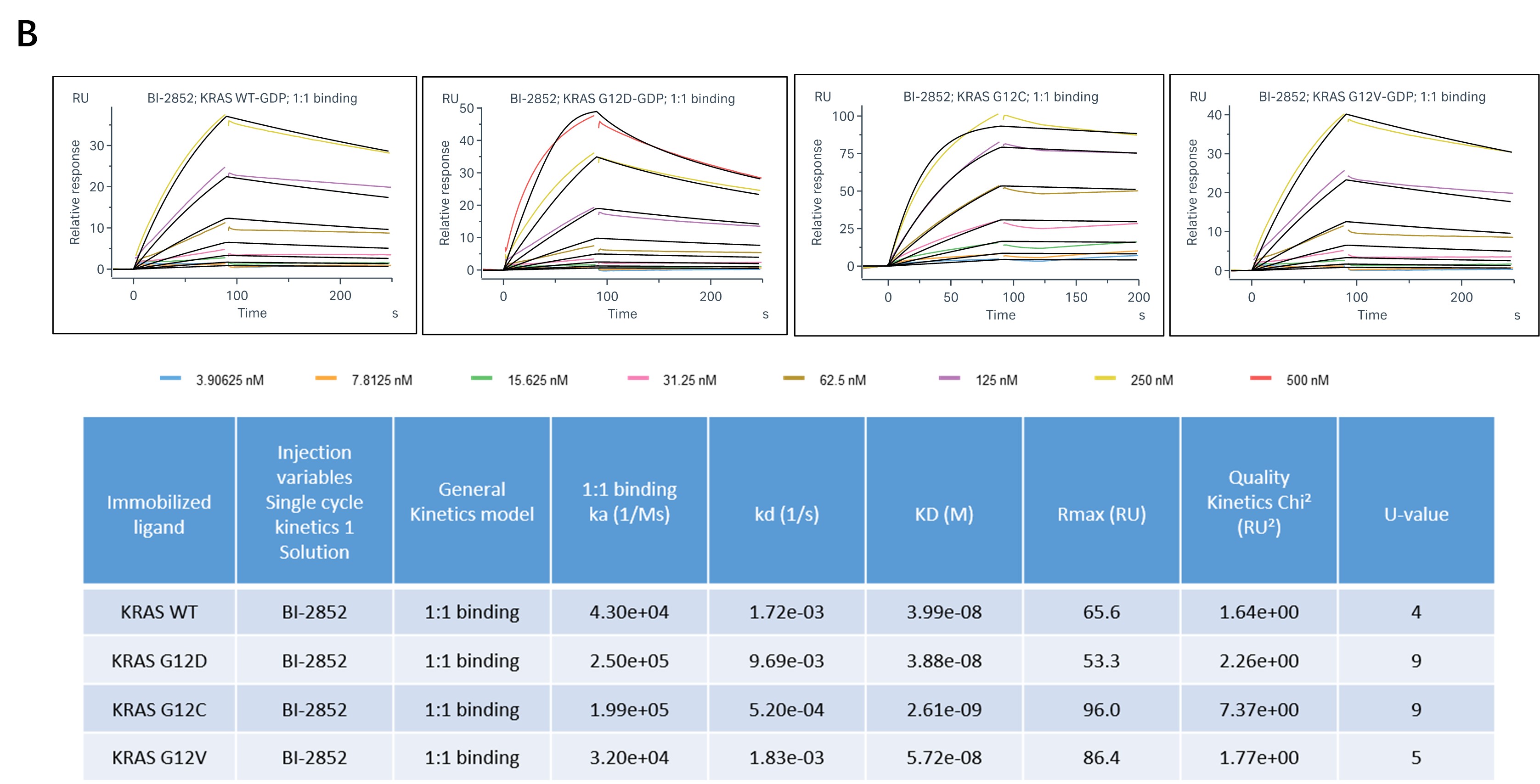The KRAS Services Platform plays a pivotal role in advancing cancer research by providing sophisticated tools to analyze KRAS gene mutations, which are among the most common oncogenic drivers in human cancers. As the KRAS gene mutations disrupt normal cellular signaling pathways, leading to uncontrolled proliferation and tumor progression, precise detection and characterization of these mutations are critical. The platform offers integrated solutions including protein purification, protein-protein interaction assays, and cell proliferation studies, all designed to accelerate drug discovery and therapeutic development. Leveraging cutting-edge technologies such as Surface Plasmon Resonance (SPR) and nucleotide exchange assays, the KRAS Services Platform facilitates detailed analysis of KRAS mutants and their interactions with regulatory proteins. This comprehensive approach empowers researchers to better understand oncogenic mechanisms and develop targeted interventions with improved efficacy.
Table of contents:
Architecture and Design of the KRAS Services Platform for Assay Automation
Analytical Sensitivity Improvements in KRAS Assay Services
Role of RAS Assays in Detecting KRAS Gene Mutations Accurately
Troubleshooting Common Challenges in KRAS Assay Services Implementation
The architecture of the KRAS Services Platform is meticulously designed to support high-throughput and precise assay automation, enabling robust evaluation of KRAS mutations and their biochemical behaviors. The platform integrates recombinant protein production, including a broad spectrum of KRAS mutant variants such as G12D, G12C, G12V, G13D, and Q61H, alongside related RAS family proteins HRAS and NRAS. Each protein batch undergoes stringent activity validation to ensure experimental reliability. The platform incorporates advanced assay formats like HTRF (Homogeneous Time-Resolved Fluorescence) and TR-FRET (Time-Resolved Förster Resonance Energy Transfer) to monitor protein-protein interactions and nucleotide exchange processes. Automation is further enhanced through multi-well plate formats (96- and 384-well), facilitating parallel processing of multiple samples. This scalable design supports diverse assay types, including SPR binding studies and cell proliferation assays using KRAS cancer cell panels and Ba/F3 cell lines. The cohesive integration of these components within the KRAS Services Platform ensures streamlined workflows, increased throughput, and reproducible data critical for drug discovery pipelines.

Enhancing analytical sensitivity is a cornerstone of the KRAS Assay Services, enabling detection of subtle molecular interactions and low-abundance KRAS mutants with high precision. The platform employs sensitive biophysical techniques such as Surface Plasmon Resonance (SPR), which quantifies binding affinities and kinetics between small molecules and KRAS mutants in both GDP- and GTP-bound states. This method provides real-time, label-free detection with exceptional sensitivity. Additionally, the nucleotide exchange assays utilize fluorescence-labeled BODIPY-GTP and HTRF to measure the transition of KRAS from inactive to active states, capturing the dynamic exchange activity catalyzed by guanine nucleotide exchange factors like SOS1 and SOS2. The use of TR-FRET further amplifies signal detection while minimizing background noise. These innovations collectively improve the limit of detection, allowing for accurate characterization of KRAS interactions and inhibitor efficacy. The refined sensitivity of the KRAS Assay Services supports early-stage drug screening and mechanistic studies, ultimately facilitating the development of more effective targeted therapies.
RAS assays are indispensable for the accurate identification and profiling of KRAS gene mutations, which constitute approximately 95% of RAS mutations in human cancers. The KRAS Services Platform offers comprehensive assays that detect mutations disrupting KRAS’s intrinsic GTPase activity, leading to constitutive activation of downstream signaling pathways that drive oncogenesis. By utilizing recombinant KRAS proteins representing key mutants (e.g., G12D, G12C, G12V), the platform enables precise biochemical and cellular characterization of mutant behavior. Protein-protein interaction assays assess KRAS binding to regulatory factors such as SOS1, SOS2, and downstream effectors like cRAF, providing insights into mutation-specific signaling alterations. Furthermore, cell-based proliferation assays using specialized KRAS cancer cell panels and Ba/F3 cells allow evaluation of mutation-driven cellular responses to therapeutic compounds. This multi-faceted approach ensures that RAS assays deliver high specificity and sensitivity in mutation detection, supporting personalized medicine strategies and targeted drug development.
Implementing KRAS Assay Services can encounter challenges such as protein instability, assay variability, and sensitivity limitations, which require strategic troubleshooting to ensure data quality. Protein purification of KRAS mutants demands careful optimization to maintain functional integrity, as improper handling can lead to aggregation or loss of activity. The platform addresses this by rigorous batch validation using SDS-PAGE, SEC-HPLC, and activity assays to confirm purity and functionality. Assay variability is mitigated through standardized protocols and automation, including consistent reagent preparation and controlled incubation conditions. Sensitivity issues are tackled by employing advanced detection methods like HTRF and TR-FRET, which enhance signal-to-noise ratios. Additionally, the platform supports troubleshooting through parallel assay formats, such as combining SPR with nucleotide exchange assays, to cross-validate results. Addressing these challenges systematically ensures reliable implementation of KRAS Assay Services, fostering reproducible and accurate experimental outcomes critical for drug discovery.
The KRAS Services Platform stands as an essential resource in the landscape of cancer research, offering a sophisticated suite of assays and tools tailored for the detection and characterization of KRAS mutations. Its architecture integrates advanced automation and diverse assay formats, enabling high-throughput and sensitive analysis that is vital for understanding the molecular underpinnings of oncogenesis. The platform’s enhancements in analytical sensitivity, including the use of SPR and fluorescence-based nucleotide exchange assays, allow researchers to detect subtle biochemical changes and assess inhibitor efficacy with precision. By accurately profiling KRAS mutations and their interactions with regulatory proteins, the KRAS Assay Services facilitate targeted therapeutic development. Moreover, the platform addresses common implementation challenges through rigorous validation and standardized workflows, ensuring consistent and reproducible results. Together, these features make the KRAS Services Platform a cornerstone in accelerating drug discovery and advancing personalized cancer treatment strategies.
2026-02-04
2026-02-04
2026-02-04
2026-02-04
We value your inquiries and are here to provide you with tailored solutions for your drug discovery and development needs. Whether you have questions, require more information, or are interested in discussing potential collaborations, our team of experts is just a message away.
Feel free to reach out to us.